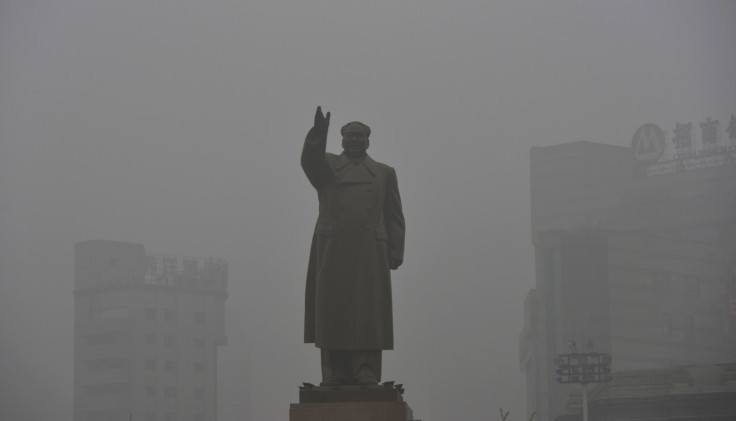China 2013 GDP Growth To Hit 7.6%, Misses Environmental Targets

China's Cabinet estimates this year's economic growth slowed to 7.6 percent -- the weakest in 14 years -- and warned the growth model based on exports and investment is running out of steam, the official Xinhua News Agency said Thursday, citing the nation's top planning official.
The forecast is below the 2012 rate of 7.7 percent and the 9.3 percent recorded in 2011, but above the government's 7.5 percent target set at the beginning of this year.
Economic growth has been higher than expected since 2011 despite a declining trend, said a midterm evaluation report on the implementation of the 12th five-year development plan (2011 to 2015). A 7.6 percent pace would mark a third consecutive annual drop in the GDP growth rate. The five-year plan set an annual growth target of 7 percent between 2011 and 2015.
"We cannot deny a downward pressure on economic growth," the minister in charge of the Cabinet's planning agency, Shaoshi Xu, was quoted as saying. “The traditional comparative advantage is weakening, while it will take time for us to build a new advantage,” he added.
China’s top leaders set the economic growth target for 2014 at about 7.5 percent, Chinese financial news outlet Caixin reported Dec. 16, citing a conclusion reached at the annual central economic work conference that ended Dec. 13. The official announcement of the growth goal usually comes in March at the National People’s Congress.
The economy is also challenged by increasing risks in local government debt, the financial sector and overcapacity, which resulted from blind government investment in industrial projects, Xu said.
The report also listed several other challenges ahead, including slow economic restructuring, worsening pollution and social conflicts among interest groups.
To deepen reform efforts, the just-ended annual central economic work conference laid out six major targets for next year’s economic policy: 1) Ensure stable supply and quality of agricultural products and food safety; 2) Speed up industrial structural adjustment and resolve overcapacity problems; 3) Prevent risks from local government debt; 4) Push for coordinative regional developments; 5) Raise the average living standard and support affordable housing programs; and 6) Further open up the economy, push ahead with free trade zone negotiations.
People's Daily reported on Wednesday that Beijing's municipal leaders have lowered the city's economic growth target from 8 percent in 2013 to 7.5 percent in 2014 -- setting an example for other cities and provinces as the top leadership seeks a more sustainable and high-quality growth pattern.
Environment
This year has been an extraordinarily polluted year in China. Most major cities have been hit by hazardous smog in 2013, including Beijing in January and Shanghai earlier this month. Chinese netizens have been joking Santa Claus would be lost in China, "even with a radar system." Several major state run media outlets picked up on the story of Santa and his reindeer wandering around confused amid the haze, Foreign Policy reports.
The midterm evaluation report on the implementation of the 12th five-year development plan revealed that China has failed to meet environmental targets ranging from energy use to nitrogen oxide emissions during the 2011-2012 period.
According to the plan, although China wants to reduce energy consumption per unit of GDP by 16 percent by 2015, energy intensity fell just 5.5 percent in the first two years of the plan, Xinhua said. And while it wants to reduce the amount of carbon produced per unit of GDP by 17 percent by 2015, carbon intensity was down only 6.6 percent in 2012 from 2010 levels, it said.
Meanwhile, non-fossil fuels accounted for 9.4 percent of China’s total energy mix in 2012, up from 8.6 percent in 2010, Xinhua said. The country’s target is 11.4 percent by 2015.
The emission of nitrogen oxides in 2011 and 2012, which closely affects air quality, increased by 2.82 percent from 2010. The target seeks to reduce 10 percent from 2010 to 2015.
The report describes the issues as "grave" with pollution spreading and damage worse and lasting longer in the long term. Xu said the country will ban new energy-intensive projects in areas where energy consumption is already out of control and pledged to “deploy more legal and economic means” to cut pollution.
© Copyright IBTimes 2025. All rights reserved.






















